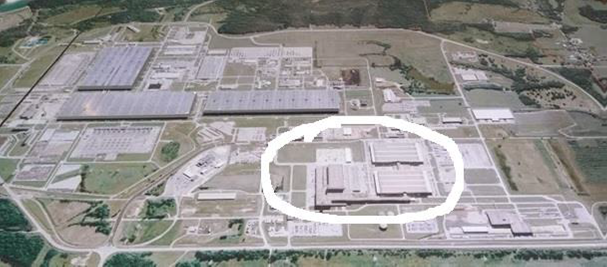As readers of The Free Press may know, the Portsmouth Nuclear Site at Piketon, Ohio, is heavily contaminated with radioactivity from 50 years of operations that enriched uranium to make nuclear bombs, and later to fuel nuclear power.
This process used as much electricity as New York City and includes some of the largest buildings in the world. Less than 1% of natural uranium is the type of isotope (uranium-235) that will fission, or explode. Enrichment is the name of the process that removes much of the uranium-238 that cannot be fissioned.
New no-bid enrichment contract at Piketon: In November, 2019, the uranium enrichment company Centrus announced the finalizing of a three-year contract to demonstrate what is being called High Assay Low Enriched Uranium (HALEU) production at Piketon. The $115-million no-bid contract with the Department of Energy (DOE) is for centrifuge technology that would enrich uranium up to 19.75% of its U-235. The contract calls for a pilot plant of 16 centrifuges.
Why this precise figure, 19.75%? Uranium enriched to 20% is considered weapons-usable. Laws restrict its export. While HALEU is being touted for experimental Small Modular Nuclear Reactors, it is also being advertised as for “national security purposes” – think nuclear bombs. Concerns about the dangers of crossover and comingling between military and civiliannuclear activitieswith HALEU production have been expressed by top scientists and nuclear experts.
There are already two sources of HALEU for domestic use: DOE’s Idaho National Labs facility has tons of HALEU that can be used. Urenco, a private company in New Mexico, could produce HALEU for much less cost than the small, expensive Centrus facility that could cost $10 billion or more. Why is there a need for this new facility at Piketon?
Bankrupt USEC became Centrus: In a second attempt to enrich uranium at Piketon, the private entityUSEC, Inc.put about $2.5 billion, much of it taxpayer money, into its failed American Centrifuge Plant. DOE gave USEC hundreds of millions of dollars for the ACP after USEC stock became junk-rated. USEC’s attempts to get a $2 billion DOE loan guarantee, championed by Ohio’s governor and senators on both sides of the aisle, eventually failed. USEC declared bankruptcy in 2014, emerging out of the ashes with a new name: Centrus.
Daniel Poneman, Centrus CEO: In April, 2015 the Project on Government Oversight wrote a scathing article, The Revolving Door Goes Nuclear,about how Poneman, who served as the number two official at DOE, became president and CEO of Centrus in less than six months after leaving DOE. Poneman has DOE inside knowledge and connections for getting deals for Centrus. His total compensation was $2,404,724 in 2018.
Why a no-bid contract? In a letter to DOE Secretary Perry, four influential U.S. Representatives (2 Republicans and 2 Democrats)have asked DOE Secretary Rick Perry how Centrus won the $115-million contract to demonstrate HALEU at Piketon. In addition, their letterasks how the contract was funded, why other companies were not allowed to compete for the award, and whether there is a need for HALEU at the present time.
Centrus, HALEU and Saudi Arabia: Centrus is one of seven companies in a consortium calling itself IP3 International. In January, 2017, four IP3 leaders and chief executives of the companies – one of whom was Poneman from Centrus – signed a letter to Saudi Arabian Crown Prince Mohammed bin Salman. The letter expressed a desire to create a long term government-to-government and commercial-to-commercial partnership between the U.S. and Saudi Arabia. Other intrigues with IP3, nuclear technology and Saudi Arabia were uncovered.
The U.S. House Committee on Oversight and Reform is investigating secretive negotiations between the White House and Saudi Arabia to export nuclear reactors and related technology to Saudi Arabia. The Oversight Committee published its first report, entitled Whistleblowers Raise Grave Concerns with Trump Administration’s Efforts to Transfer Sensitive Nuclear Technology to Saudi Arabiain February 2019. In July the Oversight Committee published its second report entitled Corporate and Foreign Interests Behind White House Push to Transfer U.S. Nuclear Technology to Saudi Arabia. Secretary of State Mike Pompeo and DOE Secretary Rick Perry have both stonewalled congressional committees, according to The Guardian.
Centrus has a license to enrich uranium to 5% that belongs to its shuttered American Centrifuge Plant. But to enrich to a higher level, they would likely need a license amendment from the Nuclear Regulatory Commission. And the ACP would need a Supplemental Environmental Impact Statement. Watchdogs needed here.
Aside from the issue of HALEU production, stopping Donald Trump and IP3 from giving nuclear technology to other countries, Saudi Arabia in particular, is of utmost importance.




